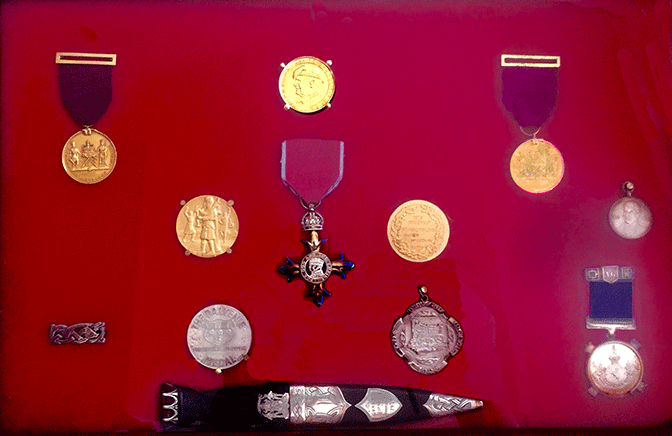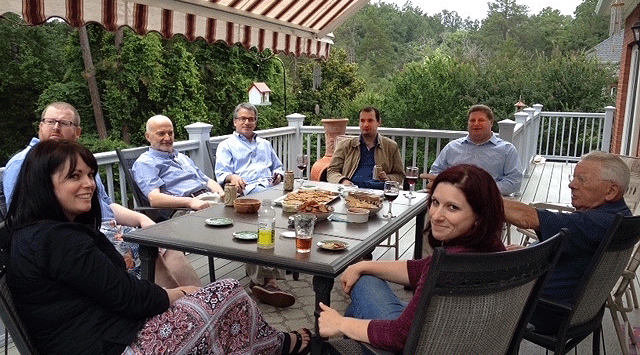Greenville Highland Games Professional Piping, May 29, 2016
By Robert Wallace
The most impressive aspect of the Jimmy McIntosh MBE piobaireachd competition (held as part of the Greenville SC Highland Games) was the level of musicianship of the participants. They demonstrated an understanding of time signatures and phrasing not always heard on the professional stage. Much of that can be credited to Jimmy himself.
Now 90 and living in Anderson, South Carolina, he moved south from Pittsburgh PA almost three years ago. Before being succeeded by Alasdair Gillies, Jimmy had been piping professor at Carnegie Mellon University (CMU). Many of his former students travelled to take part in the Greenville competition and I am sure he would have been pleased with their playing.
They included the winner Nick Hudson who gave us that ceol mor tour-de-force, Lament for the Laird of Anapool. The high G was perfectly pitched as he set out on his long, difficult journey. He really brought the best out of this tune with some subtle touches of expression you do not often hear. I was a bit disconcerted by the rundown he added to Var 3 and this is something I think he needs to review. Using the E and D connecting notes in this variation as theme notes is not to my taste either but this is not something any adjudicator could hold against him. He finished in style with crisp taorluaths and crunluaths. Nick is pictured above with Andrew Carlisle winner of the MSR.
Second prize went to Dan Lyden who pushed on in the required fashion with the Red Speckled Bull, a slight lack of variety in the repeated phrases the only downside to his expression. The drones could have locked in more, but crucially they chimed well with the C each time it was played. Third was Andrew Carlisle, the current piping professor at CMU, with a disappointing Clan Chattan’s Gathering. He was slow from the start; never got going at all; finger and pipe exemplary.
Reedmaker Alistair Murray is originally from Northern Ireland but now lives in Pittsburgh. A good instrument, he too was hesitant in the early part of the Old Men of the Shells. He eventually got going in Variation 3 but lost a little control in the doubling; dre and edre a shade tight.
Of the others, Matt Pantaleoni had pipe problems and several half-chokes in My King Has Landed in Moidart, Dave Mason’s You’re Welcome Ewan Locheil was more of a dirge than a celebration, but like Andrew Carlisle he had a fine pipe and finger. The instrument of the day went to Bill Caudill. Rich and steady, his was the sort of bagpipe that would have graced ANY competition and I’m including Oban and Inverness here. Unfortunately Bill struggled with darado at the ends of the lines in the Rout of Glen Fruin and was also very snappy with cadence Es in the Thumb. Liz Cherry needs a better instrument to match the interpretive and technical quality she demonstrated in Lament for Donald Duaghal MacKay. Katy Rashid shaped up the Park Piobaireachd No.2 very well, and Grace Abernethy had a good Lady MacDonald’s Lament though she was inconsistent with her connecting notes and the middle beats in the phrases. Weaker instruments and errors cost both pipers consideration.

The MSR was judged by veteran Sandy Jones and won by Andrew Carlisle, the Hornpipe and Jig by Nick Hudson. Both pipers are coming to Scotland to compete later in the summer and will be looking to build on their not inconsiderable reputations.
Sandy was telling me he has run his North American Piping Academy in North Carolina for 45 years. He and John MacFadyen first talked about it back in 1970 and it has been going ever since with classes during most of June and July. Sandy said they would miss greatly the presence of the late Ed Neigh who taught there for 14 years.
Sitting in with Sandy as a trainee judge was piper Skip Cleavinger. The Eastern United States Pipe Band Association deem that putative judges must do 15 trial runs before they get their adjudicators’ ticket. They also have to sit an examination with some very tricky but important questions on ceol mor and ceol beag minutiae. Skip is well on the way to completing his training.
After the contest I held a workshop where we discussed piobaireachd competition in general and I was able to elaborate on what I’d written in the pipers’ crit sheets . The comments seemed to be well received and I was grateful to escape with my hide intact. Everyone, competitors, judges, organisers then headed back to Jimmy and Joyce’s splendid demesne for refreshment and chat on the verandah.

Jimmy McIntosh has dedicated himself to passing on the teaching he had from Bob Brown and Bob Nicol at Balmoral. The work he has done in the United States in doing just that will be a lasting legacy.















Recent Comments